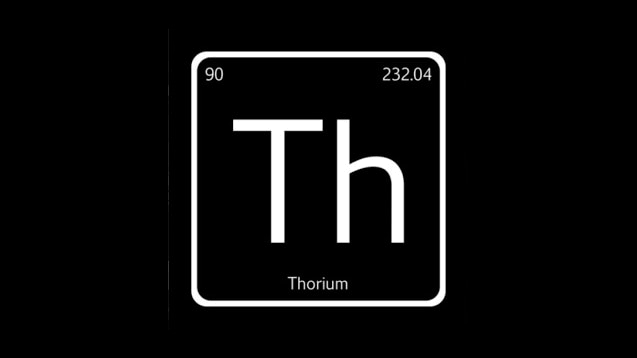China Unveils Landmark Thorium Reactor, A Leap Towards Sustainable Nuclear Energy
June 15, 2023 - A breakthrough has occurred in the realm of advanced nuclear technologies as China’s National Nuclear Safety Administration has granted the nation's first operational permit for a thorium reactor. This significant development marks a milestone in China's pursuit of next-generation nuclear technologies

June 15, 2023 - A breakthrough has occurred in the realm of advanced nuclear technologies as China’s National Nuclear Safety Administration has granted the nation's first operational permit for a thorium reactor. This significant development marks a milestone in China's pursuit of next-generation nuclear technologies and underlines its commitment to long-term, sustainable energy solutions.
The thorium reactor, a two-megawatt liquid-fuelled thorium molten salt reactor (MSR), is located in the Gobi Desert city of Wuwei, in the Gansu province. Operated by the Shanghai Institute of Applied Physics, the thorium reactor has been granted a permit to operate for ten years, paving the way for China to potentially utilize thorium as a major energy source in the future.
MSRs use liquid fuels, typically molten salts, as both a fuel and a coolant, providing potential advantages over traditional uranium reactors, including increased safety, reduced waste, improved fuel efficiency, and suitability for deployment in arid, landlocked areas. Moreover, thorium is more abundant compared to uranium, and China is known to possess significant thorium reserves.
Industry experts have hailed this reactor as a triumph for China's nuclear energy sector. They see it as a testament to China's strides in developing and deploying advanced nuclear technologies and establishing itself as a potential front-runner in thorium reactor technology.
In a further boost to the advancement of this technology, the Shanghai Institute has initiated a follow-up project – a small-scale modular thorium MSR research facility – at the same site. This endeavor aims to fine-tune the technology and resolve technical challenges, thus paving the way for large-scale deployment of thorium reactors, which could potentially strengthen China's energy security and contribute to environmental sustainability.
However, getting to this point hasn't been without its trials. Launched in 2011, construction of the reactor began only in 2018. However, the work progressed smoothly, and the reactor was built in about three years, half the initially estimated time. Subsequently, it took more than two years for environmental authorities to confirm the facility's adherence to the highest safety standards.
China is not the pioneer in thorium reactor development. Previous endeavors by the United States and India to build thorium reactors did not progress beyond the experimental stage due to various factors including limited funding, shifting priorities, and technical challenges.
With the go-ahead, the thorium MSR will undergo test operations after initial fuel loading. These tests, critical to the start-up process of the reactor, will ensure its safe progression towards a self-sustaining state.
China, believed to possess one of the world's largest thorium reserves, could potentially meet its energy needs for over 20,000 years. The success of thorium MSRs would enable the expansion of China's nuclear energy supply to inland cities, thus diversifying its energy mix, reducing fossil fuel dependence, and meeting the growing energy demands from inland regions.
Experts caution, however, that even though this progress is promising, it does not necessarily imply that all technological challenges have been overcome. The development and deployment of new nuclear technologies, such as thorium MSRs, can be expensive and complex. The initiation of the Shanghai Institute's small-scale modular thorium MSR project indicates China's intent to further reduce the technology's cost and make it more accessible.
These small reactors, easily transportable and suitable for installation in remote or off-grid areas, are of great strategic interest to China. They are part of the plan to sell small thorium reactors to other countries as part of the Belt and Road Initiative, Beijing’s global infrastructure plan. The smaller size and modular nature of these reactors make them more accessible and financially viable for countries or regions with smaller energy demands or limited grid infrastructure. This can potentially provide a nuclear entry point for these regions, contributing to a global expansion of advanced nuclear technologies.
Though this step is significant, the journey towards fully realizing the potential of thorium reactors is not without its challenges. The ability to manufacture components in a factory setting and transport them to the site can streamline the construction process and improve cost efficiency, but regulatory, economic, and technical issues must still be surmounted for successful large-scale deployment.
Nonetheless, the inauguration of China's first thorium reactor is a landmark achievement. It symbolizes China's commitment to energy security, environmental sustainability, and advanced nuclear technology. Thorium-based energy could potentially revolutionize the nuclear industry, not just in China, but globally, providing a safer, more efficient, and more sustainable alternative to traditional uranium reactors.
As China continues to push the boundaries of nuclear technology with its thorium reactor, the world watches with bated breath. If successful, this technology could offer a compelling blueprint for future sustainable nuclear energy, not just for China, but for the entire world.
In a world striving to combat climate change and seeking cleaner, more sustainable energy solutions, the success of China's thorium reactor could be a game changer. The stakes are high, and the potential rewards vast – for China, and for a world in dire need of sustainable, efficient, and safe energy solutions. It's not just a step forward for China, but potentially, a giant leap for humankind.




